The Cambridge History of China. Vol. 13: Republican China 1912-1949, Part 2
Подождите немного. Документ загружается.

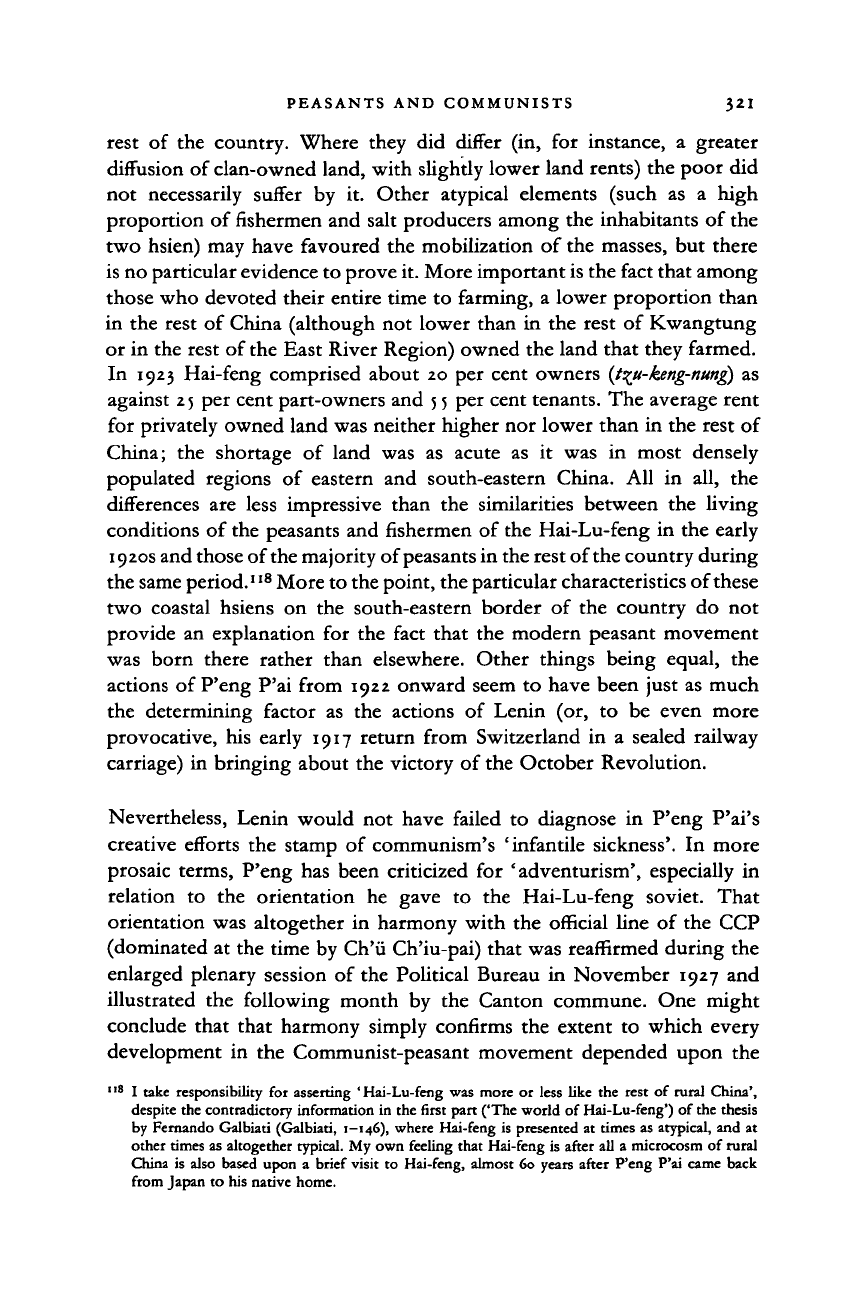
PEASANTS AND COMMUNISTS 321
rest of the country. Where they did differ (in, for instance, a greater
diffusion of clan-owned land, with slightly lower land rents) the poor did
not necessarily suffer by it. Other atypical elements (such as a high
proportion of fishermen and salt producers among the inhabitants of the
two hsien) may have favoured the mobilization of the masses, but there
is no particular evidence to prove it. More important is the fact that among
those who devoted their entire time to farming, a lower proportion than
in the rest of China (although not lower than in the rest of Kwangtung
or in the rest of the East River Region) owned the land that they farmed.
In 1923 Hai-feng comprised about 20 per cent owners
{t^u-keng-nung)
as
against
2 5
per cent part-owners and
5 5
per cent tenants. The average rent
for privately owned land was neither higher nor lower than in the rest of
China; the shortage of land was as acute as it was in most densely
populated regions of eastern and south-eastern China. All in all, the
differences are less impressive than the similarities between the living
conditions of the peasants and fishermen of the Hai-Lu-feng in the early
1920s
and those of the majority of peasants in the rest of the country during
the same period.
118
More to the point, the particular characteristics of these
two coastal hsiens on the south-eastern border of the country do not
provide an explanation for the fact that the modern peasant movement
was born there rather than elsewhere. Other things being equal, the
actions of P'eng P'ai from 1922 onward seem to have been just as much
the determining factor as the actions of Lenin (or, to be even more
provocative, his early 1917 return from Switzerland in a sealed railway
carriage) in bringing about the victory of the October Revolution.
Nevertheless, Lenin would not have failed to diagnose in P'eng P'ai's
creative efforts the stamp of communism's 'infantile sickness'. In more
prosaic terms, P'eng has been criticized for 'adventurism', especially in
relation to the orientation he gave to the Hai-Lu-feng soviet. That
orientation was altogether in harmony with the official line of the CCP
(dominated at the time by Ch'u Ch'iu-pai) that was reaffirmed during the
enlarged plenary session of the Political Bureau in November 1927 and
illustrated the following month by the Canton commune. One might
conclude that that harmony simply confirms the extent to which every
development in the Communist-peasant movement depended upon the
118
I take responsibility for asserting 'Hai-Lu-feng was more or less like the rest of rural China',
despite the contradictory information in the first part ("The world of Hai-Lu-feng') of the thesis
by Fernando Galbiati (Galbiati, i—146), where Hai-feng is presented at times as atypical, and at
other times as altogether typical. My own feeling that Hai-feng is after all a microcosm of rural
China is also based upon a brief visit to Hai-feng, almost 60 years after P'eng P'ai came back
from Japan to his native home.
Cambridge Histories Online © Cambridge University Press, 2008
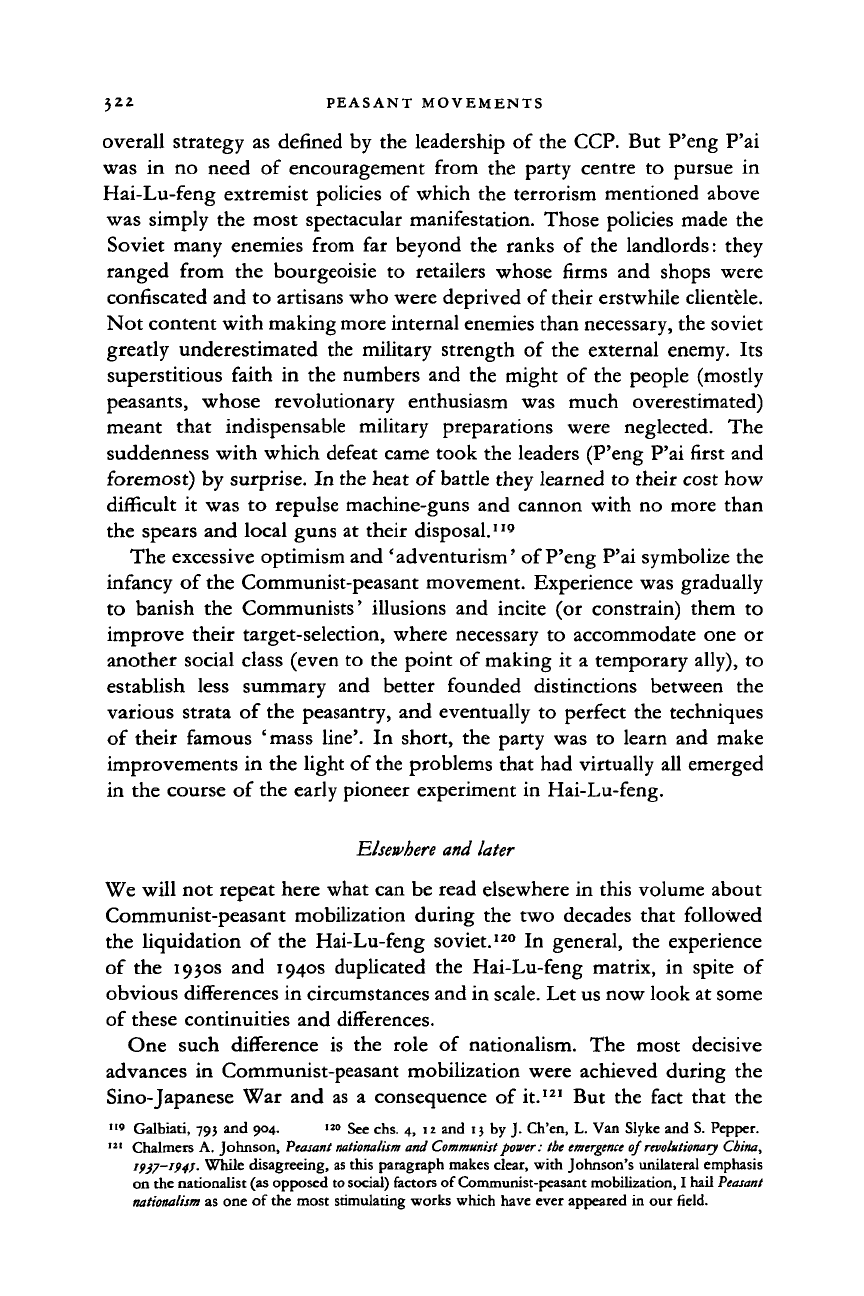
2-22 PEASANT MOVEMENTS
overall strategy as denned by the leadership of the CCP. But P'eng P'ai
was in no need of encouragement from the party centre to pursue in
Hai-Lu-feng extremist policies of which the terrorism mentioned above
was simply the most spectacular manifestation. Those policies made the
Soviet many enemies from far beyond the ranks of the landlords: they
ranged from the bourgeoisie to retailers whose firms and shops were
confiscated and to artisans who were deprived of their erstwhile clientele.
Not content with making more internal enemies than necessary, the soviet
greatly underestimated the military strength of the external enemy. Its
superstitious faith in the numbers and the might of the people (mostly
peasants, whose revolutionary enthusiasm was much overestimated)
meant that indispensable military preparations were neglected. The
suddenness with which defeat came took the leaders (P'eng P'ai first and
foremost) by surprise. In the heat of battle they learned to their cost how
difficult it was to repulse machine-guns and cannon with no more than
the spears and local guns at their disposal.
119
The excessive optimism and 'adventurism' of P'eng P'ai symbolize the
infancy of the Communist-peasant movement. Experience was gradually
to banish the Communists' illusions and incite (or constrain) them to
improve their target-selection, where necessary to accommodate one or
another social class (even to the point of making it a temporary ally), to
establish less summary and better founded distinctions between the
various strata of the peasantry, and eventually to perfect the techniques
of their famous 'mass line'. In short, the party was to learn and make
improvements in the light of the problems that had virtually all emerged
in the course of the early pioneer experiment in Hai-Lu-feng.
Elsewhere and later
We will not repeat here what can be read elsewhere in this volume about
Communist-peasant mobilization during the two decades that followed
the liquidation of the Hai-Lu-feng soviet.
120
In general, the experience
of the 1930s and 1940s duplicated the Hai-Lu-feng matrix, in spite of
obvious differences in circumstances and in scale. Let us now look at some
of these continuities and differences.
One such difference is the role of nationalism. The most decisive
advances in Communist-peasant mobilization were achieved during the
Sino-Japanese War and as a consequence of it.
121
But the fact that the
119
Galbiati, 793 and 904.
'">
See chs. 4, 12 and 13 by J. Ch'en, L. Van Slyke and S. Pepper.
121
Chalmers A. Johnson, Peasant nationalism and Communist power: the
emergence
of
revolutionary
China,
<9}7~
I
94J-
While disagreeing, as this paragraph makes clear, with Johnson's unilateral emphasis
on the nationalist (as opposed to social) factors of Communist-peasant mobilization, I hail
Peasant
nationalism
as one of the most stimulating works which have ever appeared in our field.
Cambridge Histories Online © Cambridge University Press, 2008
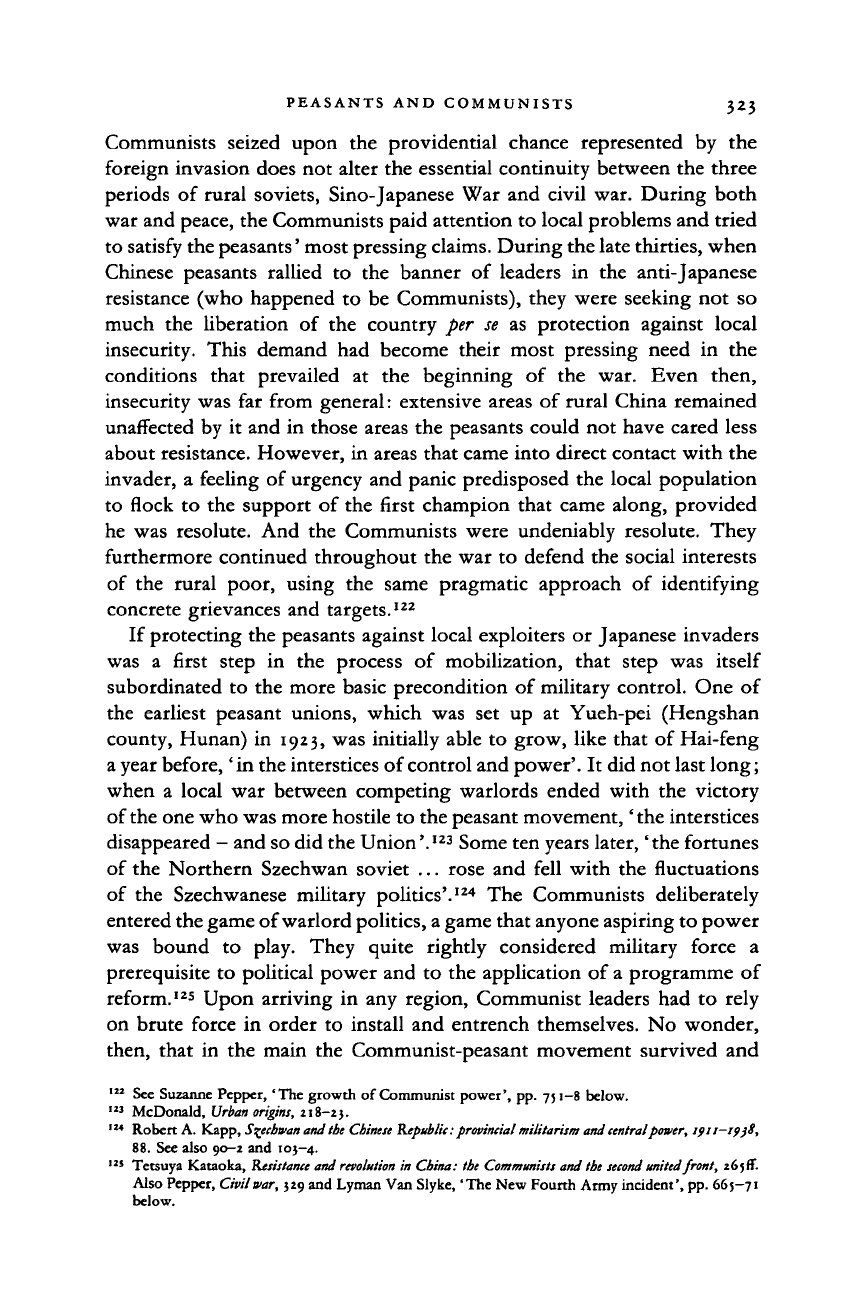
PEASANTS AND COMMUNISTS 323
Communists seized upon the providential chance represented by the
foreign invasion does not alter the essential continuity between the three
periods of rural Soviets, Sino-Japanese War and civil war. During both
war and peace, the Communists paid attention to local problems and tried
to satisfy the peasants' most pressing claims. During the late thirties, when
Chinese peasants rallied to the banner of leaders in the anti-Japanese
resistance (who happened to be Communists), they were seeking not so
much the liberation of the country per se as protection against local
insecurity. This demand had become their most pressing need in the
conditions that prevailed at the beginning of the war. Even then,
insecurity was far from general: extensive areas of rural China remained
unaffected by it and in those areas the peasants could not have cared less
about resistance. However, in areas that came into direct contact with the
invader, a feeling of urgency and panic predisposed the local population
to flock to the support of the first champion that came along, provided
he was resolute. And the Communists were undeniably resolute. They
furthermore continued throughout the war to defend the social interests
of the rural poor, using the same pragmatic approach of identifying
concrete grievances and targets.
122
If protecting the peasants against local exploiters or Japanese invaders
was a first step in the process of mobilization, that step was itself
subordinated to the more basic precondition of military control. One of
the earliest peasant unions, which was set up at Yueh-pei (Hengshan
county, Hunan) in 1923, was initially able to grow, like that of Hai-feng
a year before, 'in the interstices of control and power'. It did not last long;
when a local war between competing warlords ended with the victory
of the one who was more hostile to the peasant movement, 'the interstices
disappeared - and so did the Union'.
123
Some ten years later, 'the fortunes
of the Northern Szechwan soviet ... rose and fell with the fluctuations
of the Szechwanese military politics'.
124
The Communists deliberately
entered the game of warlord politics, a game that anyone aspiring to power
was bound to play. They quite rightly considered military force a
prerequisite to political power and to the application of a programme of
reform.
125
Upon arriving in any region, Communist leaders had to rely
on brute force in order to install and entrench themselves. No wonder,
then, that in the main the Communist-peasant movement survived and
122
See Suzanne Pepper, "The growth of Communist power', pp. 751-8 below.
123
McDonald, Urban origins, 218—25.
124
Robert A. Kapp, S^ecbwan and the Chinese Republic: provincial militarism andcentralpower, 1)11—1938,
88.
See also 90—2 and 103—4.
125
Tetsuya Kataoka, Resistance and revolution
in
China: the Communists and the second united front, 265
ff.
Also Pepper, Civil war, 329 and Lyman Van Slyke,' The New Fourth Army incident', pp. 665-71
below.
Cambridge Histories Online © Cambridge University Press, 2008
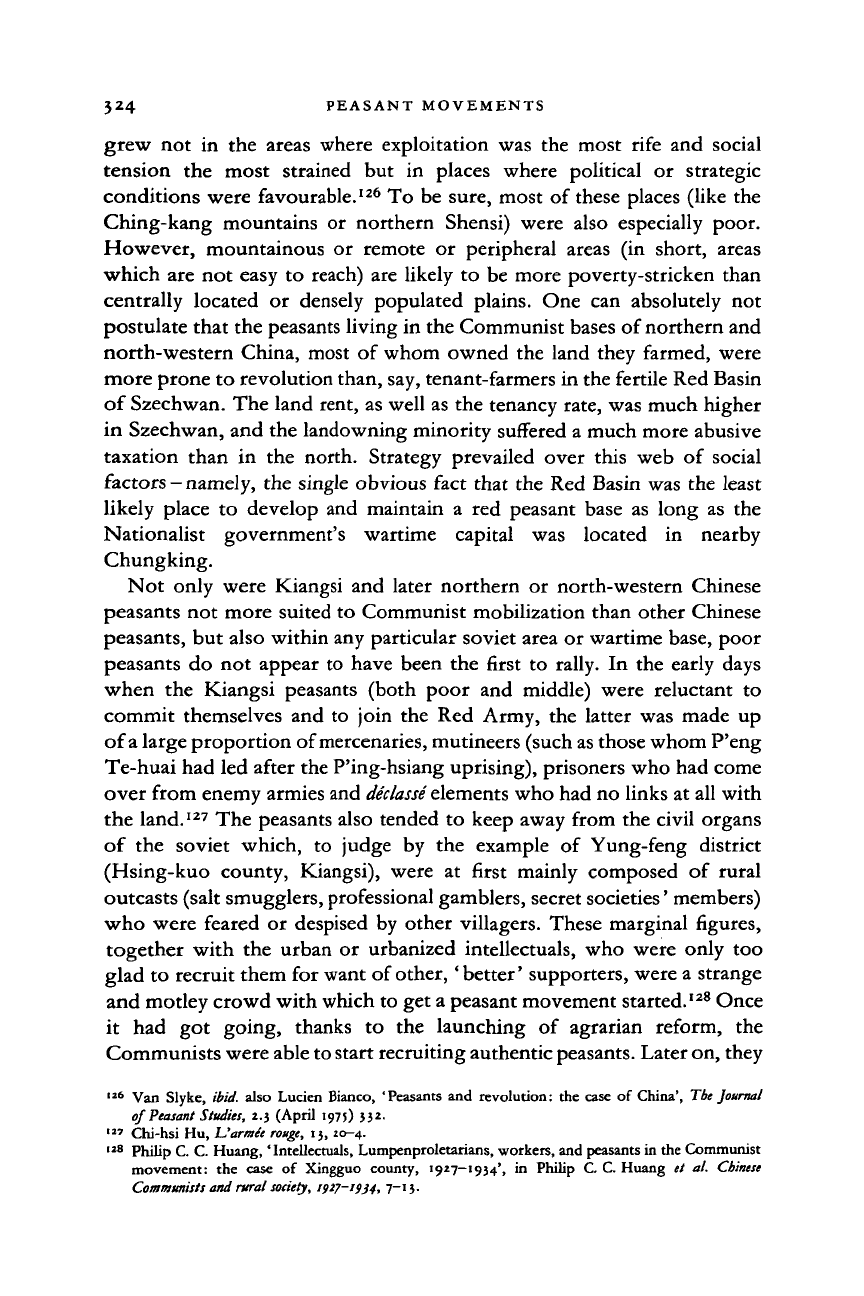
324 PEASANT MOVEMENTS
grew not in the areas where exploitation was the most rife and social
tension the most strained but in places where political or strategic
conditions were favourable.
126
To be sure, most of these places (like the
Ching-kang mountains or northern Shensi) were also especially poor.
However, mountainous or remote or peripheral areas (in short, areas
which are not easy to reach) are likely to be more poverty-stricken than
centrally located or densely populated plains. One can absolutely not
postulate that the peasants living in the Communist bases of northern and
north-western China, most of whom owned the land they farmed, were
more prone to revolution than, say, tenant-farmers in the fertile Red Basin
of Szechwan. The land rent, as well as the tenancy rate, was much higher
in Szechwan, and the landowning minority suffered a much more abusive
taxation than in the north. Strategy prevailed over this web of social
factors -
namely,
the single obvious fact that the Red Basin was the least
likely place to develop and maintain a red peasant base as long as the
Nationalist government's wartime capital was located in nearby
Chungking.
Not only were Kiangsi and later northern or north-western Chinese
peasants not more suited to Communist mobilization than other Chinese
peasants, but also within any particular soviet area or wartime base, poor
peasants do not appear to have been the first to rally. In the early days
when the Kiangsi peasants (both poor and middle) were reluctant to
commit themselves and to join the Red Army, the latter was made up
of a large proportion of mercenaries, mutineers (such as those whom P'eng
Te-huai had led after the P'ing-hsiang uprising), prisoners who had come
over from enemy armies and
declasse
elements who had no links at all with
the land.
127
The peasants also tended to keep away from the civil organs
of the soviet which, to judge by the example of Yung-feng district
(Hsing-kuo county, Kiangsi), were at first mainly composed of rural
outcasts (salt smugglers, professional gamblers, secret societies' members)
who were feared or despised by other villagers. These marginal figures,
together with the urban or urbanized intellectuals, who were only too
glad to recruit them for want of other, 'better' supporters, were a strange
and motley crowd with which to get a peasant movement started.
128
Once
it had got going, thanks to the launching of agrarian reform, the
Communists were able to start recruiting authentic
peasants.
Later on, they
126
Van
Slyke,
ibid,
also Lucien Bianco, 'Peasants
and
revolution:
the
case
of
China',
The
Journal
of Peasant Studies,
2.3
(April 1975) 532.
127
Chi-hsi Hu, Uarmie rouge, 13, 20-4.
128
Philip C.
C.
Huang, 'Intellectuals, Lumpenproletarians, workers, and peasants
in
the Communist
movement:
the
case
of
Xingguo county, 1927-1934',
in
Philip
C. C.
Huang
et al.
Chinese
Communists and rural
society,
1927-19)4, 7-13.
Cambridge Histories Online © Cambridge University Press, 2008
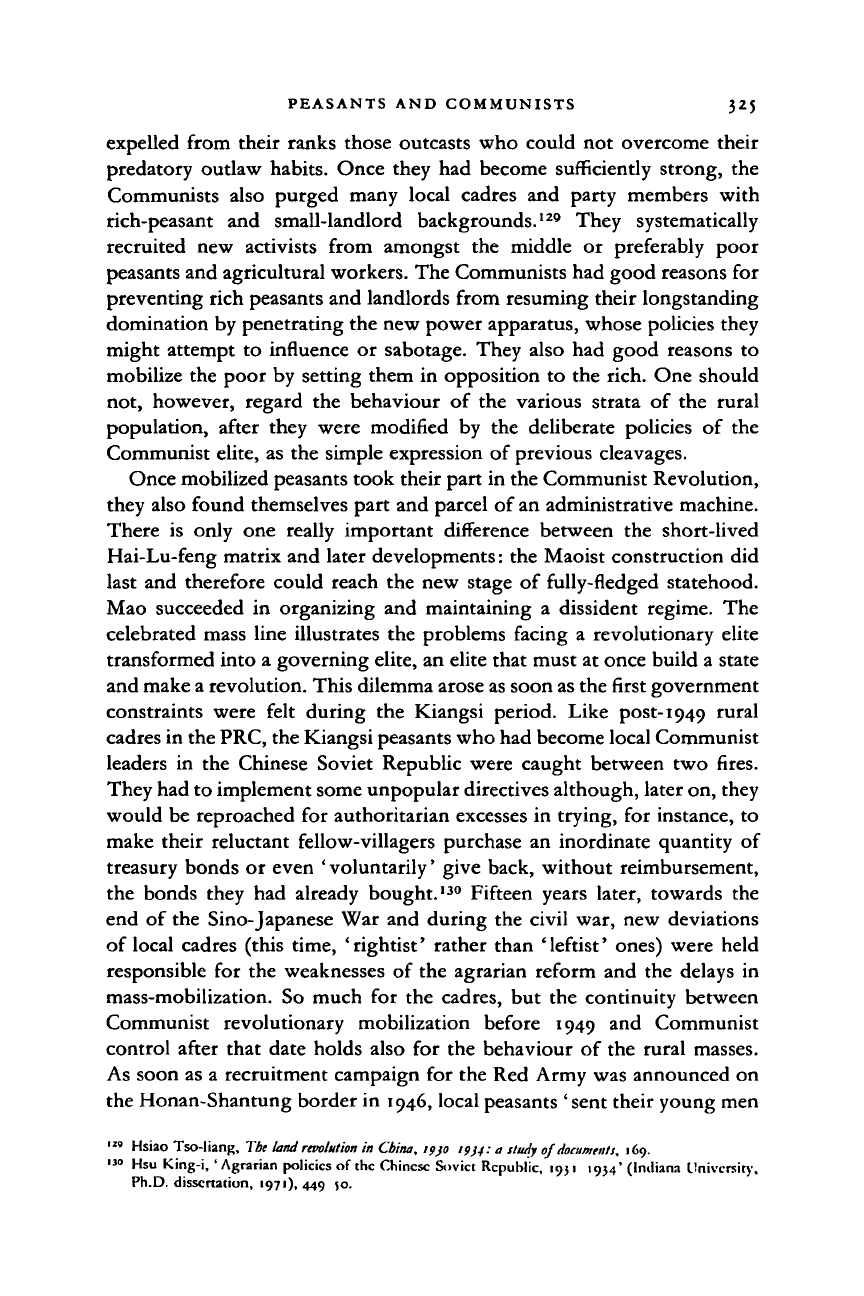
PEASANTS AND COMMUNISTS 325
expelled from their ranks those outcasts who could
not
overcome their
predatory outlaw habits. Once they
had
become sufficiently strong,
the
Communists also purged many local cadres
and
party members with
rich-peasant
and
small-landlord backgrounds.
129
They systematically
recruited
new
activists from amongst
the
middle
or
preferably poor
peasants and agricultural workers. The Communists had good reasons for
preventing rich peasants and landlords from resuming their longstanding
domination by penetrating the new power apparatus, whose policies they
might attempt
to
influence
or
sabotage. They also
had
good reasons
to
mobilize the poor by setting them
in
opposition
to
the rich. One should
not, however, regard
the
behaviour
of the
various strata
of the
rural
population, after they were modified
by the
deliberate policies
of the
Communist elite,
as
the simple expression
of
previous cleavages.
Once mobilized peasants took their part in the Communist Revolution,
they also found themselves part and parcel
of
an administrative machine.
There
is
only
one
really important difference between
the
short-lived
Hai-Lu-feng matrix and later developments: the Maoist construction did
last
and
therefore could reach
the
new stage
of
fully-fledged statehood.
Mao succeeded
in
organizing
and
maintaining
a
dissident regime.
The
celebrated mass line illustrates
the
problems facing
a
revolutionary elite
transformed into
a
governing elite, an elite that must
at
once build
a
state
and make a revolution. This dilemma arose as soon as the first government
constraints were felt during
the
Kiangsi period. Like post-1949 rural
cadres in the PRC, the Kiangsi peasants who had become local Communist
leaders
in the
Chinese Soviet Republic were caught between
two
fires.
They had to implement some unpopular directives although, later on, they
would
be
reproached
for
authoritarian excesses
in
trying,
for
instance,
to
make their reluctant fellow-villagers purchase
an
inordinate quantity
of
treasury bonds
or
even ' voluntarily' give back, without reimbursement,
the bonds they
had
already bought.
130
Fifteen years later, towards
the
end
of
the Sino-Japanese War
and
during
the
civil war, new deviations
of local cadres (this time,
'
rightist' rather than ' leftist' ones) were held
responsible
for the
weaknesses
of
the agrarian reform
and the
delays
in
mass-mobilization.
So
much
for the
cadres,
but the
continuity between
Communist revolutionary mobilization before
1949 and
Communist
control after that date holds also
for the
behaviour
of
the rural masses.
As soon as
a
recruitment campaign
for
the Red Army was announced
on
the Honan-Shantung border in 1946, local peasants 'sent their young men
IM
Hsiao Tso-liang, The land
revolution
in
China, ipjo 19)4:
a
study
of
documents,
169.
l}
° Hsu King-i,' Agrarian policies
of
the Chinese Soviet Republic, 1931 1934' (Indiana University,
Ph.D.
dissertation, 1971), 449
50.
Cambridge Histories Online © Cambridge University Press, 2008
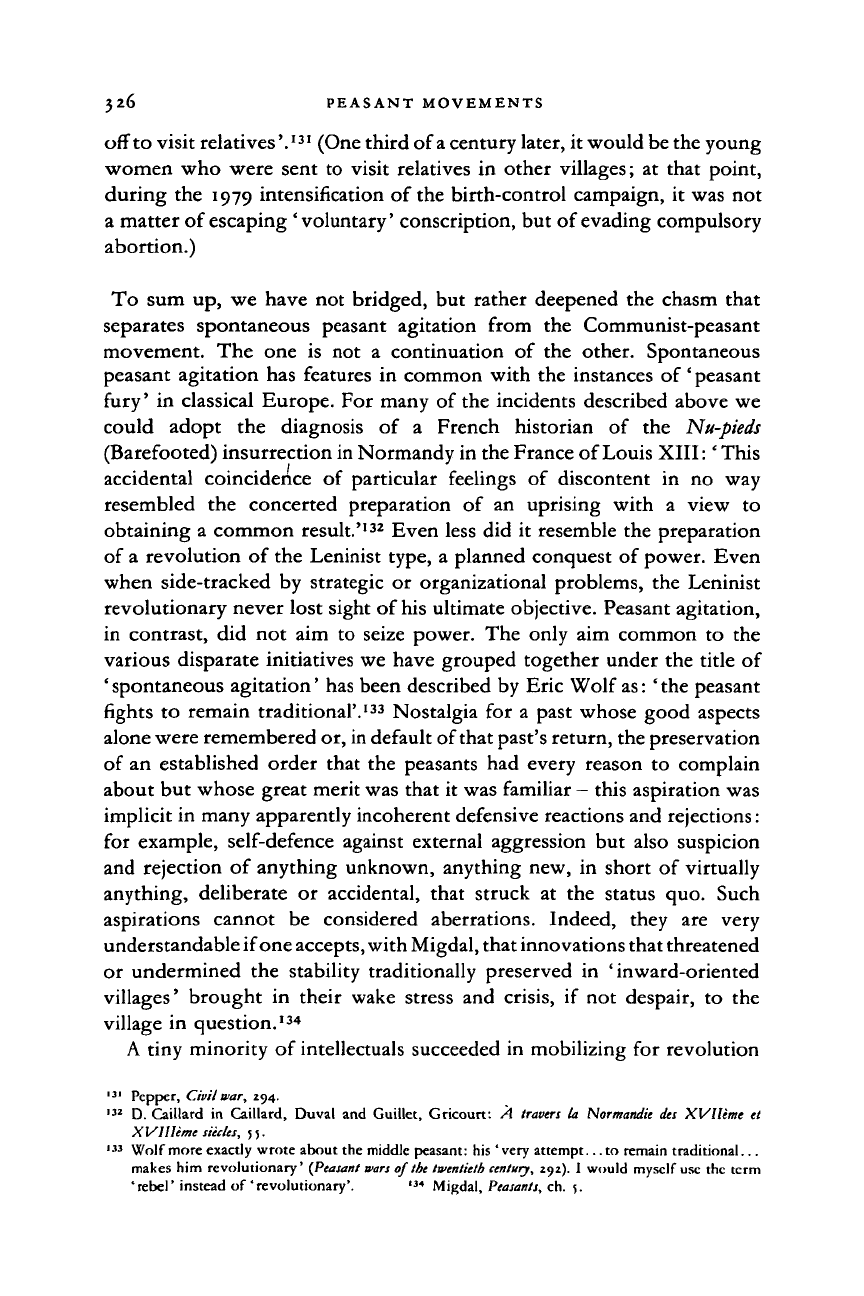
326 PEASANT MOVEMENTS
off to visit relatives'.
131
(One third of a century later, it would be the young
women who were sent
to
visit relatives
in
other villages;
at
that point,
during
the
1979 intensification
of
the birth-control campaign,
it
was
not
a matter
of
escaping 'voluntary' conscription, but of evading compulsory
abortion.)
To sum up,
we
have
not
bridged,
but
rather deepened
the
chasm that
separates spontaneous peasant agitation from
the
Communist-peasant
movement.
The one is not a
continuation
of the
other. Spontaneous
peasant agitation has features
in
common with
the
instances
of
' peasant
fury'
in
classical Europe.
For
many
of
the incidents described above
we
could adopt
the
diagnosis
of a
French historian
of the
Nu-pieds
(Barefooted) insurrection in Normandy in the France of Louis XIII:' This
accidental coincidence
of
particular feelings
of
discontent
in no way
resembled
the
concerted preparation
of an
uprising with
a
view
to
obtaining
a
common result.'
132
Even less
did it
resemble the preparation
of a revolution
of
the Leninist type,
a
planned conquest
of
power. Even
when side-tracked
by
strategic
or
organizational problems,
the
Leninist
revolutionary never lost sight
of
his
ultimate objective. Peasant agitation,
in contrast,
did not aim to
seize power.
The
only
aim
common
to the
various disparate initiatives we have grouped together under the title
of
' spontaneous agitation' has been described by Eric Wolf
as:
' the peasant
fights to remain traditional'.
133
Nostalgia
for a
past whose good aspects
alone were remembered or, in default of that past's return, the preservation
of
an
established order that
the
peasants
had
every reason
to
complain
about but whose great merit was that
it
was familiar
-
this aspiration was
implicit in many apparently incoherent defensive reactions and rejections:
for example, self-defence against external aggression
but
also suspicion
and rejection
of
anything unknown, anything new,
in
short
of
virtually
anything, deliberate
or
accidental, that struck
at the
status quo. Such
aspirations cannot
be
considered aberrations. Indeed, they
are
very
understandable if one
accepts,
with Migdal, that innovations that threatened
or undermined
the
stability traditionally preserved
in
'inward-oriented
villages' brought
in
their wake stress
and
crisis,
if not
despair,
to the
village
in
question.
134
A tiny minority
of
intellectuals succeeded
in
mobilizing
for
revolution
131
Pepper, Civil
war, 294.
132
D.
Caillard
in
Caillard, Duval
and
Guillet, Gricourt:
A
travcrs
la
Normandic
dts
XVllime
et
XVllUme
slides,
5;.
133
Wolf more exactly wrote about
the
middle peasant:
his
'very attempt.
..to
remain traditional...
makes
him
revolutionary' (Peasant wars
of
the twentieth century,
292).
1
would myself
use the
term
'rebel' instead of'revolutionary'.
134
Migdal, Peasants,
ch.
5.
Cambridge Histories Online © Cambridge University Press, 2008
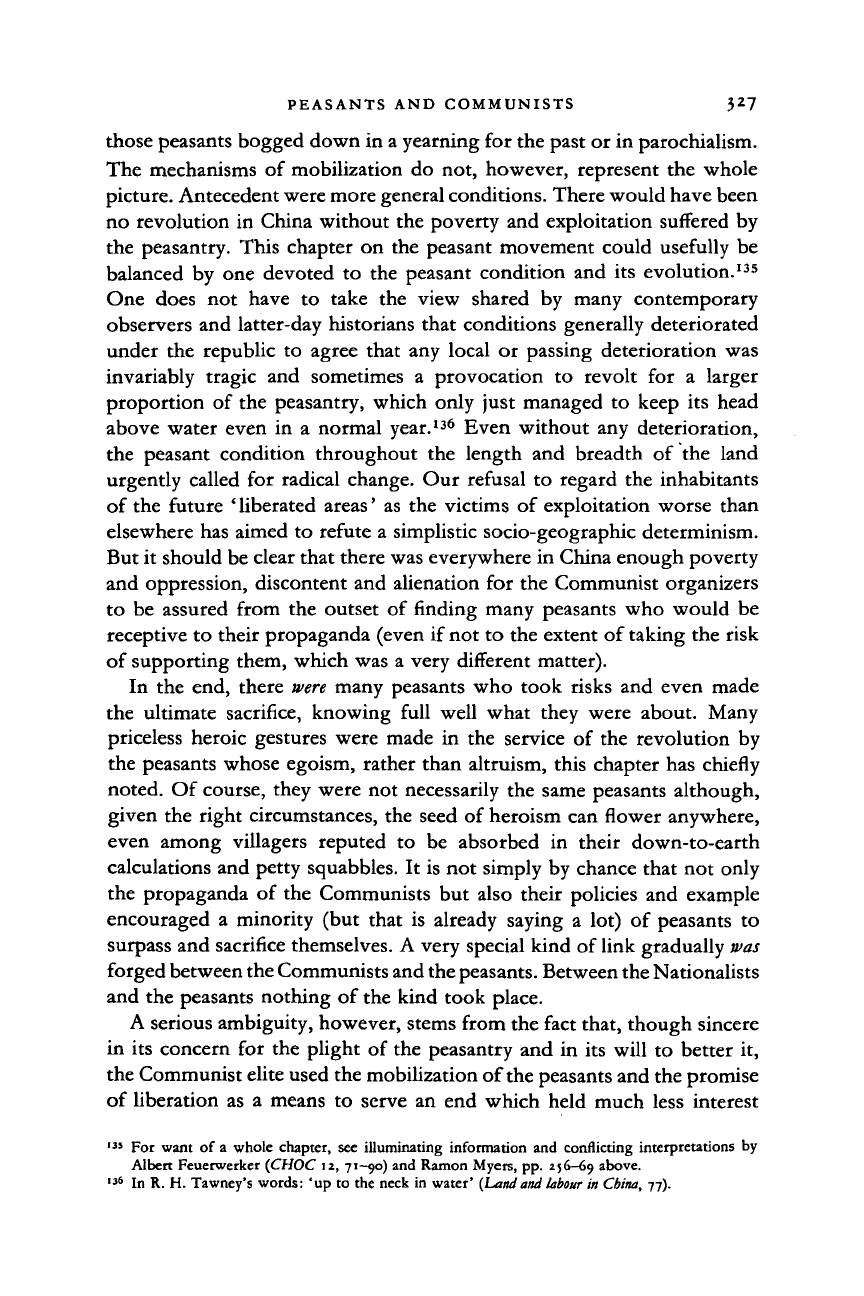
PEASANTS AND COMMUNISTS
those peasants bogged down in a yearning for the past or in parochialism.
The mechanisms of mobilization do not, however, represent the whole
picture. Antecedent were more general conditions. There would have been
no revolution in China without the poverty and exploitation suffered by
the peasantry. This chapter on the peasant movement could usefully be
balanced by one devoted to the peasant condition and its evolution.
135
One does not have to take the view shared by many contemporary
observers and latter-day historians that conditions generally deteriorated
under the republic to agree that any local or passing deterioration was
invariably tragic and sometimes a provocation to revolt for a larger
proportion of the peasantry, which only just managed to keep its head
above water even in a normal year.
136
Even without any deterioration,
the peasant condition throughout the length and breadth of the land
urgently called for radical change. Our refusal to regard the inhabitants
of the future ' liberated areas' as the victims of exploitation worse than
elsewhere has aimed to refute a simplistic socio-geographic determinism.
But it should be clear that there was everywhere in China enough poverty
and oppression, discontent and alienation for the Communist organizers
to be assured from the outset of finding many peasants who would be
receptive to their propaganda (even if not to the extent of taking the risk
of supporting them, which was a very different matter).
In the end, there
were
many peasants who took risks and even made
the ultimate sacrifice, knowing full well what they were about. Many
priceless heroic gestures were made in the service of the revolution by
the peasants whose egoism, rather than altruism, this chapter has chiefly
noted. Of course, they were not necessarily the same peasants although,
given the right circumstances, the seed of heroism can flower anywhere,
even among villagers reputed to be absorbed in their down-to-earth
calculations and petty squabbles. It is not simply by chance that not only
the propaganda of the Communists but also their policies and example
encouraged a minority (but that is already saying a lot) of peasants to
surpass and sacrifice themselves. A very special kind of link gradually
was
forged between the Communists and the
peasants.
Between the Nationalists
and the peasants nothing of the kind took place.
A serious ambiguity, however, stems from the fact that, though sincere
in its concern for the plight of the peasantry and in its will to better it,
the Communist elite used the mobilization of the peasants and the promise
of liberation as a means to serve an end which held much less interest
135
For want of a whole chapter, see illuminating information and conflicting interpretations by
Albert Feuerwerker {CHOC 12, 71-90) and Ramon Myers, pp. 256-69 above.
136
In R. H.
Tawney's words:
'up to
the neck
in
water' [hand and labour
in
China, 77).
Cambridge Histories Online © Cambridge University Press, 2008
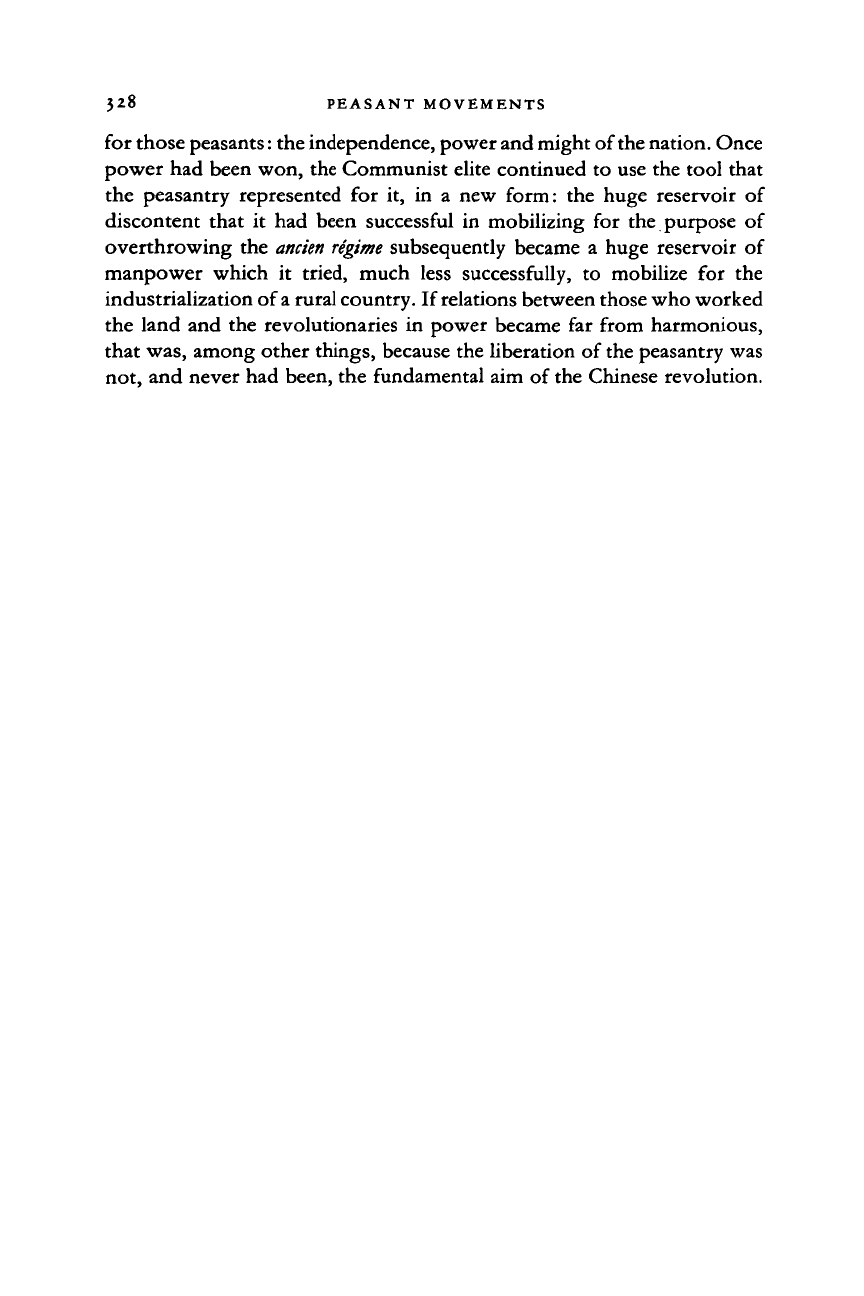
328 PEASANT MOVEMENTS
for those peasants: the independence, power and might of the nation. Once
power had been won, the Communist elite continued to use the tool that
the peasantry represented for it, in a new form: the huge reservoir of
discontent that it had been successful in mobilizing for the purpose of
overthrowing the
ancien regime
subsequently became a huge reservoir of
manpower which it tried, much less successfully, to mobilize for the
industrialization of a rural country. If relations between those who worked
the land and the revolutionaries in power became far from harmonious,
that was, among other things, because the liberation of the peasantry was
not, and never had been, the fundamental aim of the Chinese revolution.
Cambridge Histories Online © Cambridge University Press, 2008
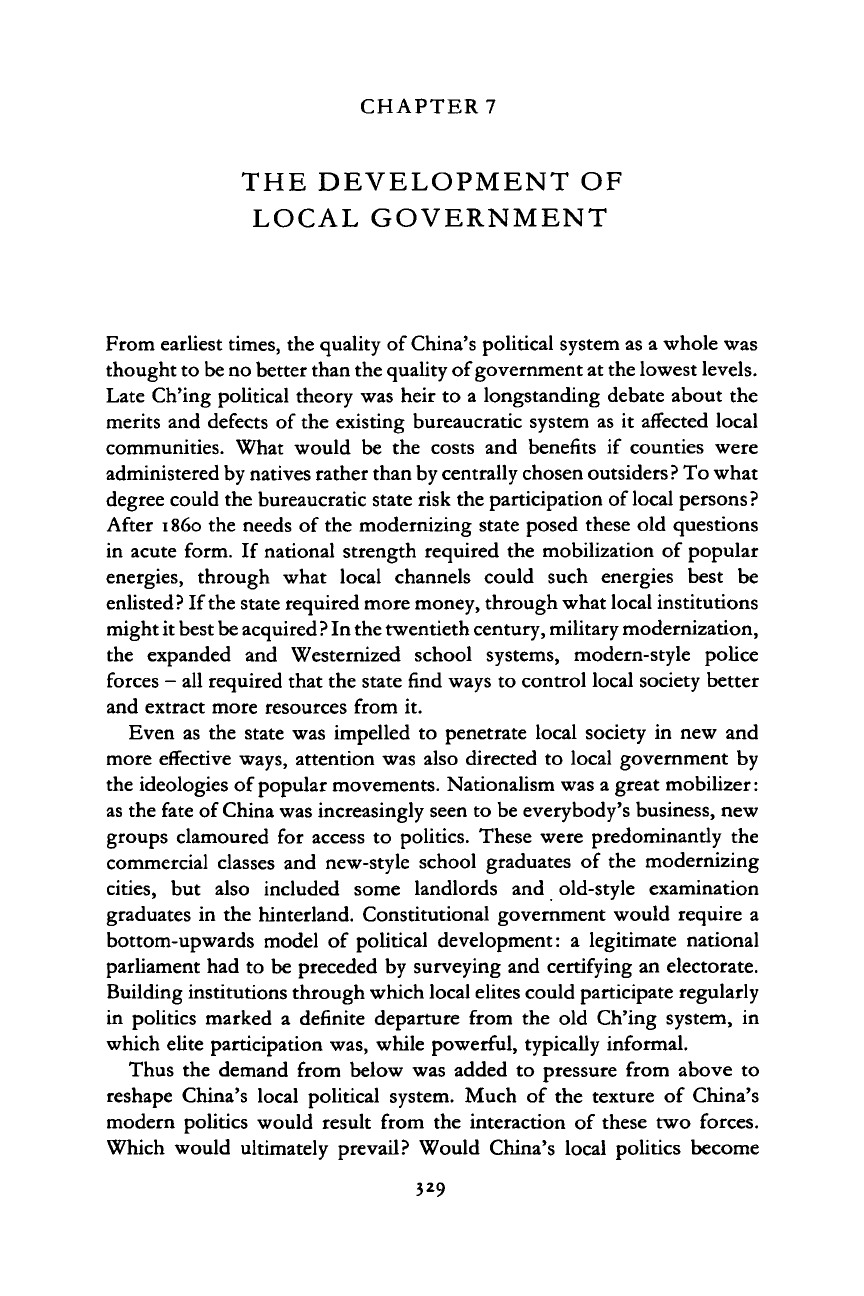
CHAPTER
7
THE DEVELOPMENT OF
LOCAL GOVERNMENT
From earliest times, the quality of China's political system as a whole was
thought to be no better than the quality of government at the lowest levels.
Late Ch'ing political theory was heir
to a
longstanding debate about the
merits and defects
of
the existing bureaucratic system as
it
affected local
communities. What would
be the
costs
and
benefits
if
counties were
administered by natives rather than by centrally chosen outsiders? To what
degree could the bureaucratic state risk the participation of local persons?
After 1860 the needs
of
the modernizing state posed these old questions
in acute form.
If
national strength required the mobilization
of
popular
energies, through what local channels could such energies best
be
enlisted? If the state required more money, through what local institutions
might it best be acquired
?
In the twentieth century, military modernization,
the expanded
and
Westernized school systems, modern-style police
forces
-
all required that the state find ways to control local society better
and extract more resources from
it.
Even
as the
state was impelled
to
penetrate local society
in
new
and
more effective ways, attention was also directed
to
local government
by
the ideologies of popular movements. Nationalism was a great mobilizer:
as the fate of China was increasingly seen to be everybody's business, new
groups clamoured
for
access
to
politics. These were predominantly
the
commercial classes
and
new-style school graduates
of
the modernizing
cities,
but
also included some landlords
and
old-style examination
graduates
in
the hinterland. Constitutional government would require
a
bottom-upwards model
of
political development:
a
legitimate national
parliament had
to
be preceded by surveying and certifying an electorate.
Building institutions through which local elites could participate regularly
in politics marked
a
definite departure from
the old
Ch'ing system,
in
which elite participation was, while powerful, typically informal.
Thus
the
demand from below was added
to
pressure from above
to
reshape China's local political system. Much
of
the texture
of
China's
modern politics would result from
the
interaction
of
these two forces.
Which would ultimately prevail? Would China's local politics become
329
Cambridge Histories Online © Cambridge University Press, 2008
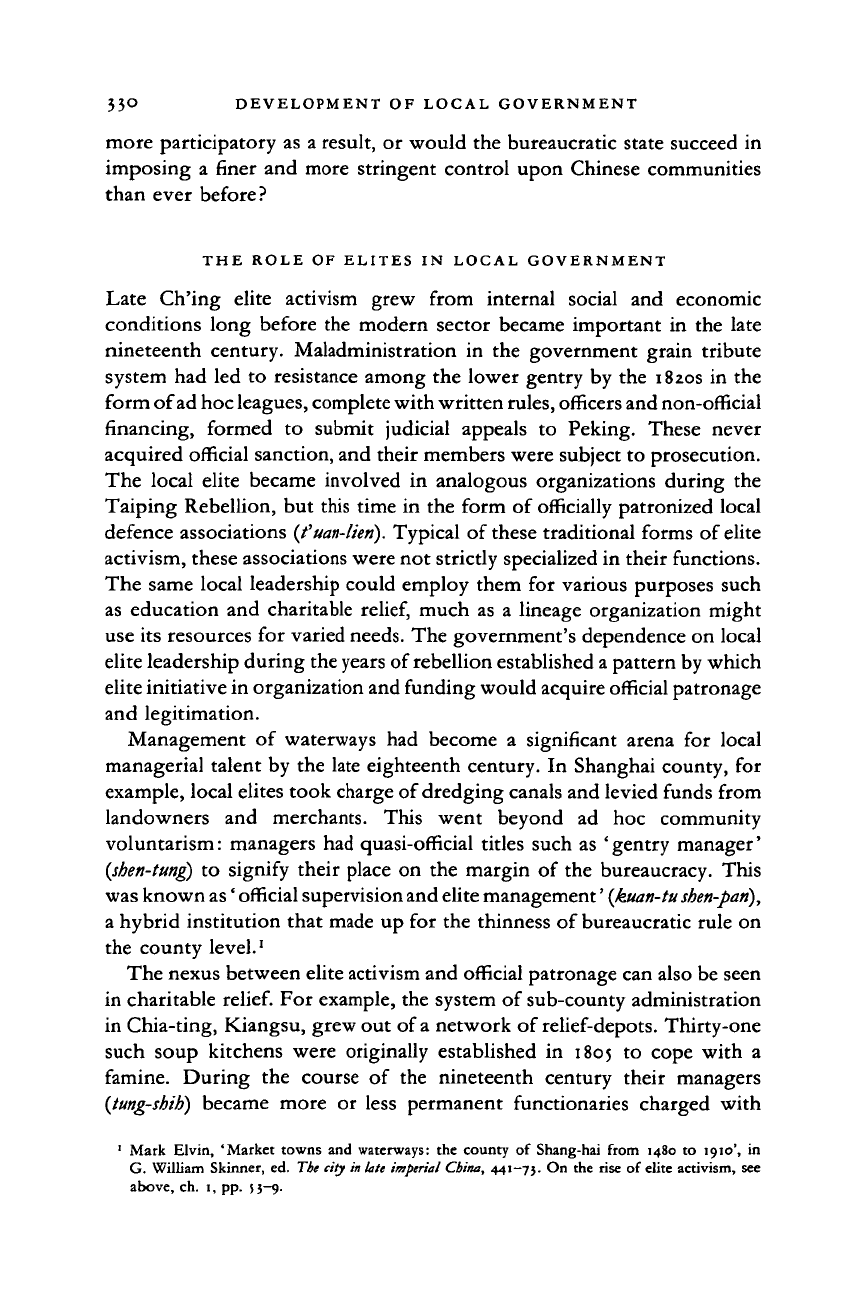
33° DEVELOPMENT OF LOCAL GOVERNMENT
more participatory
as a
result,
or
would
the
bureaucratic state succeed
in
imposing
a
finer
and
more stringent control upon Chinese communities
than ever before?
THE ROLE OF ELITES IN LOCAL GOVERNMENT
Late Ch'ing elite activism grew from internal social
and
economic
conditions long before
the
modern sector became important
in
the
late
nineteenth century. Maladministration
in
the
government grain tribute
system
had led to
resistance among
the
lower gentry
by the
1820s
in the
form of ad hoc
leagues,
complete with written rules, officers and non-official
financing, formed
to
submit judicial appeals
to
Peking. These never
acquired official sanction,
and
their members were subject
to
prosecution.
The local elite became involved
in
analogous organizations during
the
Taiping Rebellion,
but
this time
in the
form
of
officially patronized local
defence associations
(fuan-lieri).
Typical
of
these traditional forms
of
elite
activism, these associations were
not
strictly specialized
in
their functions.
The same local leadership could employ them
for
various purposes such
as education
and
charitable
relief,
much
as
a
lineage organization might
use
its
resources
for
varied needs.
The
government's dependence
on
local
elite leadership during the years
of
rebellion established a pattern
by
which
elite initiative
in
organization
and
funding would acquire official patronage
and legitimation.
Management
of
waterways
had
become
a
significant arena
for
local
managerial talent
by the
late eighteenth century.
In
Shanghai county,
for
example, local elites took charge
of
dredging canals
and
levied funds from
landowners
and
merchants. This went beyond
ad hoc
community
voluntarism: managers
had
quasi-official titles such
as
'gentry manager'
{shen-tung)
to
signify their place
on the
margin
of
the
bureaucracy. This
was known as' official supervision and elite management' (kuan-tu
shen-pan),
a hybrid institution that made
up for the
thinness
of
bureaucratic rule
on
the county level.
1
The nexus between elite activism
and
official patronage
can
also
be
seen
in charitable
relief. For
example,
the
system
of
sub-county administration
in Chia-ting, Kiangsu, grew
out of
a
network
of
relief-depots. Thirty-one
such soup kitchens were originally established
in
1805
to
cope with
a
famine. During
the
course
of the
nineteenth century their managers
(tung-shih)
became more
or
less permanent functionaries charged with
' Mark Elvin, 'Market towns
and
waterways:
the
county
of
Shang-hai from
1480
to
1910',
in
G. William Skinner,
ed.
The city
in late imperial
China,
441-75.
On the
rise
of
elite activism,
see
above,
ch. 1, pp. 53-9-
Cambridge Histories Online © Cambridge University Press, 2008
